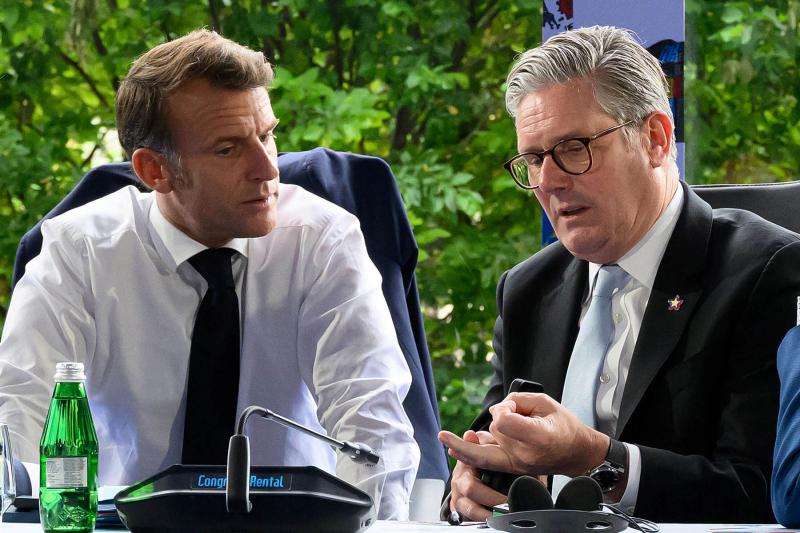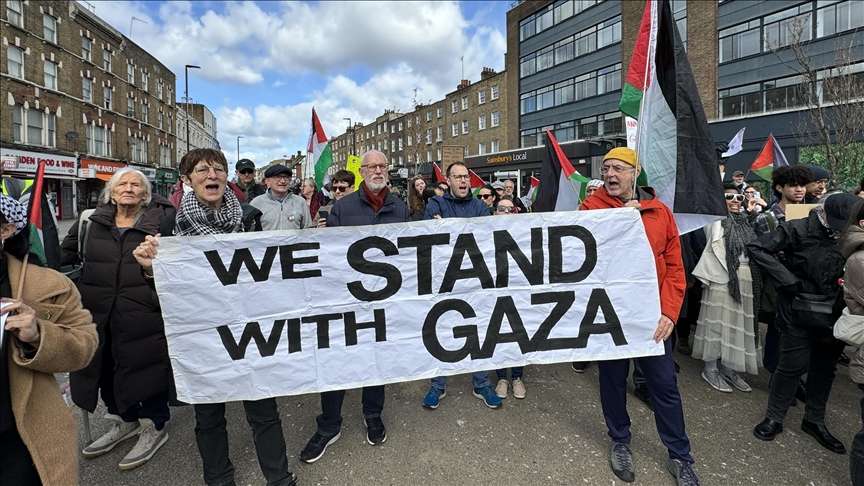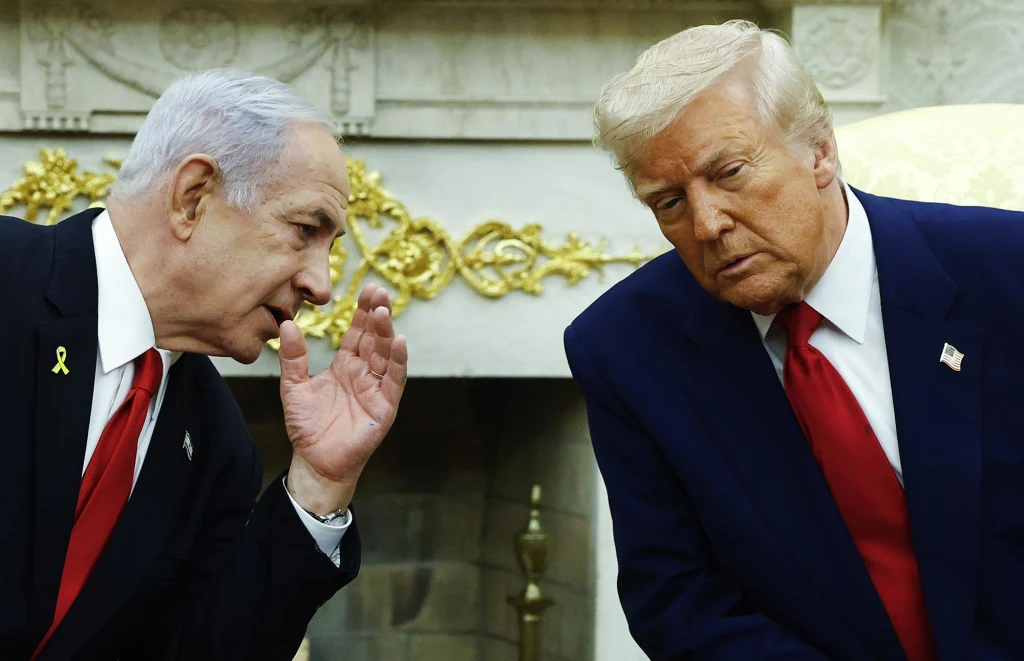Fearing judgement, Western leaders shift approach on Israel

Fearing judgement, Western leaders arguably have shifted on Israeli support. But is this a genuine moral change, or merely strategic repositioning in response to rising public anger? And what does this rhetorical pivot reveal about how leaders like Starmer, Carney and Macron, hope to be remembered?
In recent months and weeks, the Israel-Gaza conflict has entered a new stage in which Western leaders and institutions’ language has seemingly and gradually shifted towards anti-Israeli sentiments. A recent example is the UK, Australia, Norway, Canada and New Zealand announcing a joint move to sanction Israeli ministers, according to the BBC on June 10th. This is a notable shift in stance.
Previously, Western leaders initially avoided condemning Israel’s military actions in Gaza with clarity or urgency. Keir Starmer, the UK Prime Minister and leader of the Labour Party, made early statements describing the situation in neutral terms, refusing to challenge Israeli conduct directly. However, under intense pressure from within his party and from the wider electorate, Starmer has since hardened his tone. Similarly, in France, President Emmanuel Macron’s government has also adopted sharper language with similar contradictions. This gap between rhetoric and implementation leaves France’s position ambiguous and unconvincing.
At first glance, these statements might suggest a moral awakening: a long-overdue reckoning with Israel’s military campaign and its toll on Palestinian civilians. But the actions, or inactions, that follow tell another story. Despite strong words, meaningful policy change remains tenuous and sanctions are timid. While arms deals continue.
Further complicating matters, Europe’s far-right electoral gains have already shifted the political calculus. These shifts did initially reduce pressure on Israel from Western Leaders and EU institutions, potentially neutralising diplomatic criticism from the likes of Macron or Starmer. However, as Neve Gordon, Professor of International Law at Queen Mary University of London told Maghrebi, Macron, Starmer and Mark Carney, the Canadian Prime Minister, “are beginning to feel the heat from their constituencies,” since public opinion across the world is becoming louder and more and more anti-Israeli.
Nevertheless, Starmer, Macron and Carney are not acting on the basis of morality, they are acting in response to pressure. Their actions reflect calculated repositioning. With rising public anger and a growing sense that history will not be kind to enablers of genocide, Western leaders are adjusting their language to shield themselves from future condemnation. They are not speaking truth to power; they are preparing their footnotes for the history books. The question is not whether they believe in what they say, but whether they believe they will be judged for not saying anything at all.
UK
Starmer’s evolving stance appears closely tied to mounting public backlash. Many British Muslims and younger voters have grown disillusioned with the ruling Labour Party’s failure to take a clear position on Israel’s conduct in Gaza. The Labour Muslim Network revealed that 82% of Britain’s Muslims Labour MPs believe the prime minister has handled the situation in Gaza “badly”. This was a major survey from the network, where over 220 elected Muslim representatives were polled.
This comes after the disastrous Labour result in the UK local elections, and previous terrible opinion polls on Keir Starmer. One unnamed Labour Member of Parliament (MP) explained the local elections results in a blunt fashion: “We are losing to everyone, everywhere”. Considering this is less than a year since the greatest majority government in 25 years was established by Labour, the results represent a noteworthy disapproval from the public.
Although, the signs were there. Labour lost five parliamentary seats to pro-Palestinian independent candidates in 2024, a blow that revealed the depth of discontent within traditional Labour strongholds. And the public pressure has only grown more intense with every Israeli act.

The backlash extends beyond party politics. Almost 380 British and Irish writers, artists, and academics, including Zadie Smith, publicly denounced what they termed “genocide” in Gaza, in which they demanded an immediate ceasefire and called for accountability. This cultural intervention amplifies public anger and increases the pressure on political figures to respond in kind.
So it seems clear that it is in the interest of Starmer to win the Muslim members of his party back. He possibly fears his reputation will be past the point of return by the time the next election rolls around. During the 2024 General election Starmer was not too concerned about appeasing the Muslim population since election polls were always promising for a Labour win.
Chris Doyle, Director of the Council for Arab-British Understanding (Caabu) told Maghrebi, there is little doubt that British Muslims feel Starmer has “utterly failed” them. Yet, Starmer is not really thinking far ahead to the next election, because there are too many existing problems keeping him occupied at present. Rather, he is just understanding, in the same way as France and Canada, that unless the government’s condemnation of Israel increases “they know pressure will continue to grow,” according to Doyle. Although, within the UK government “there is genuine moral concern and outrage of Israel not listening,” Doyle added.
The biggest driver of policy within the Starmer Government is that they are terrified of the Trump administration
Doyle namechecked UK Foreign Secretary David Lammy as an example. But besides Lammy, the level that this outrage is sitting in the government food chain is unclear. While Lammy has called Israeli actions “intolerable”, and Israel’s blockade “unacceptable, hugely alarming and very worrying,” he has resisted calling any actions genocide.
Although, on June 10th, the BBC reported that over 300 foreign office officials raised concerns about the possibility of UK complicity in Israel’s operations in Gaza. They sent a letter to Lammy, describing Israel’s actions as a “stark… disregard for international law”. In response, the department’s top civil servants, Sir Oliver Robbins and Nick Dyer, told staff that if “disagreement with any aspect of government policy or action is profound your ultimate recourse is to resign from the Civil Service. This is an honourable course.”
One signatory said the response prompted “outrage” and criticised the shrinking space for dissent. The BBC reported that the signatories included personnel from embassies, missions and foreign office departments. They warned that ignoring internal advice could make staff complicit in future legal cases. Their letter cited the killing of 15 humanitarian workers and aid suspension in March, which prompted Israel to be accused of “using starvation as a weapon of war.” The letter criticised the UK’s arms exports and the hosting of Israel’s foreign minister Gideon Sa’ar in London. The letter stressed: “The Israeli government has made explicit plans for the forcible transfer of Gaza’s population.”
As the Associated Press reported on September 3rd 2024, while the UK introduced measures to slow certain trade processes with Israel, it stopped short of suspending arms deals outright, moves that would have signalled a genuine policy break.
As we know, the UK and Canada were among an alliance of nations which have stipulated that the Israeli ministers Itamar Ben-Gvir and Bezalel Smotrich will have their assets frozen in these Western countries and will also not be permitted to enter the countries for “repeated incitement of violence against Palestinian communities.” Both these Israeli Ministers have unashamedly pushed for more attacks against the Palestinians, which many analysts believe are genocidal comments. Gordon also criticised the UK, France and Canada, under the impression that anti-Israeli actions, such as sanctions on Israeli ministers, are insufficient. In reality, Gordon said: “[the sanctioning countries] are identifying easy targets.”
But in the specific cases of Ben-Gvir and Smotich, Doyle preferred to term the sanctions as “obvious targets.” Since their “genocidal comments” makes such a consequence unavoidable when public pressure mounts.
While the UK government has announced modest steps in response to public pressure, Starmer’s shift in language is simply smoke and mirrors. He is only going halfway to appease his population, but not all the way, which nevertheless upset the ally that is US President, Donald Trump. Doyle believes “the biggest driver of policy within the Starmer Government is that they are terrified of the Trump administration.”
In this light, Trumps recent tariff war with global nations and markets clearly caused stressed for the UK, amidst the Labour governments crusade for economic growth. Starmer’s intentions are stretched, and he is also not managing to provide a platform for public opinion, while there is equally governmental unwillingness to challenge Israeli actions.
Similarly, while the UK’s rhetoric has grown more harsh on Israel, the government’s relationship with Israel remains operational. The most damning example is the continuation of UK-Israeli military cooperation, as reported by Middle Easy Eye on June 12th. The UK is presently training Israeli army members on British land. So Starmer might be trying to appease public pressure, yet his actions do not provide us with much hope that we can trust him.
When Former Prime Ministers Tony Blair, Gordon Brown, David Cameron, Theresa May and Boris Johnson came into power, they did not know their legacies would be defined by Iraq, the 2008 financial crisis, Brexit, and Partygate, respectively. Indeed, it seems that the UK’s response to Israel’s war on Gaza could define Starmer’s legacy.
US
Trump remains largely consistent in his position on foreign policy. He continues to criticise US involvement in “endless wars,” using that narrative to justify disengagement from multilateral diplomacy in the Middle East. “Say what you like about Trump for good or ill, he’s not in a war-like pose… he wants a deal with Iran”, Doyle believes. Yet, the Israeli bombs that descended upon Iran on June 13th demonstrates the limit to Trumps influence over Israeli actions. Undoubtably the Iran-US talks, which were going well, are now over. And this is where Netanyahu will find his victory.
This is more evidence of the friction between Israel and their biggest ally, the US. Trumps recent visit to the Middle East was notable not as much for the significant deal with Saudi Arabia, but for his choice to not visit Israel. Which many analysts deemed bizarre, considering the Israeli-US alliance over the Gaza conflict.
Trump does not do friends
Additionally, friction in the Israeli-US alliance became hard to disguise when Trump made a deal with the Houthis in Yemen, a designated terrorist group who claim strong solidarity with Palestinians, and thus a staunch foe to Israel. The Houthis had been targeting shipping in the Red Sea, which is a key economic shipping lane for the US, which Trump was keen to solve. So Trump put “America first” and made a deal which reopened shipping access for the US. Leaving Israel to fend for themselves, as the Houthis promised more attacks.
However, according to Doyle, what is remarkable about the US-Houthi deal is the timing. It took place only two days after the Houthis launched a ballistic missile towards Tel Aviv’s Ben Gurion Airport. This is “extraordinary in terms of politics,” Doyle said. “The most extreme example of America first… [showcasing] Trump does not do friends.”
Trump unsurprisingly offers no substantial moral critique of Israel’s actions in Gaza. Instead, he operates on the basis of national interest, prioritising isolationist pragmatism over humanitarianism.
What’s more, Trump has consistently shown he can quickly stop favouring specific allies – irrespective of the geopolitical consequences outside of America. So the UK’s ties with the Trump administration may not be such a smart move. And this is where we find Starmer’s conundrum: the balancing act between placating public pressure, continuing an alliance with Macron and Carney, while trying to be on good terms with the unpredictable US president.
It is interesting to consider what situation we would be in if Kamala Harris was elected US president instead. Would Starmer, and to a lesser extent Carney and Macron, feel freer to be bolder in their condemnation of Israeli actions in Gaza?
[T]he liberal legal order is in crisis and . . . Trump is trying to weaken it further

The liberal “guardians”
Put together, the western leaders reveal a pattern. They now express more criticism over Israel, often in response to political pressure, but avoid aligning those words with meaningful policy change. Their language may have shifted, but their strategic interests remain.
Starmer, Carney and Macron stop short of implementing serious policy changes. They hedge, hoping their statements will indicate they “spoke up” when it mattered, even if they failed to act decisively.
In the context of Israel, Gordon believes Macron, Starmer, and Carney’s “legal language is restricted… and not looking seriously at the illegality of the arms trade and the EU free trade agreements with Israel.”
Gordan said: “There is an understanding among Macron, Starmer, Carney and others that the liberal legal order is in crisis and that Trump is trying to weaken it further, and so they want to position themselves as the guardians of this order.”
The UK, France and Canada had warned Israel that they will impose sanctions if it fails to halt its military offensive in Gaza and allow aid access. The joint statement, signed by Starmer, Macron and Carney, called Israel’s actions “wholly disproportionate” and declared: “We will not stand by while the Netanyahu Government pursues these egregious actions.”
Netanyahu responded angrily, accusing the three leaders of rewarding Hamas and encouraging further attacks. The statement also urged Israel to stop settlement expansion and warned of “further action, including targeted sanctions”. Although it avoided accusing Israel of breaking international law, instead, it said blocking humanitarian aid “risks breaching” it.
Israel’s Strategic Affairs Minister Ron Dermer warned France and the UK that Israel could annex parts of the occupied West Bank if the two countries recognise a Palestinian state. Dermer told the French foreign minister Jean-Noël Barrot and UK Foreign Secretary David Lammy, that Israel may legalise settler outposts in Area C. Sa’ar echoed the stance, threatening “unilateral actions”. Both countries, along with Canada, recently condemned Israel’s actions in Gaza and warned of “concrete actions” if it escalated. This resulted in the previously mentioned sanctions on Ben-Gvir and Smotich.
The threats of sanctions are deliberately limited in their scope. Rather than penalising Israel as a state, sanctions only target ministers or military figures. These measures do not function as coercive tools. They allow governments to appear responsive without seriously jeopardising long-standing global alliances.
France has mirrored this double-edged approach. While French officials condemned Israel’s interception of the Madleen aid ship, President Macron has refrained from pursuing sanctions that might destabilise bilateral ties. Al-Monitor via AFP reported on June 6th that France explicitly lowered its expectations around recognising a Palestinian state, reflecting Macron’s desire to maintain France’s traditional pro-Israel position.
Meanwhile, the UN General Assembly adopted a resolution demanding an immediate, unconditional, and lasting ceasefire in Gaza, according to Al-Monitor on June 12th. The resolution passed with 149 votes in favour, 12 votes against it, and 19 abstentions. The resolution urges all UN member states to take “all measures necessary” to compel Israel to comply with international law.
Palestinian envoy Riyad Mansour welcomed the vote, urging countries to act: “No arms, no money, no trade to oppress Palestinians.” Danny Danon, Israel’s envoy, dismissed the resolution as “a farce” and “a political stunt.”
Human rights organisations have also added pressure. Amnesty International recently condemned Israel’s interception of the Madleen, a civilian aid ship attempting to deliver humanitarian supplies to Gaza. Amnesty declared that the Israeli operation “flouts international law” and called on governments to uphold legal standards in how they respond to such acts. This language, grounded in international legal frameworks, raises the stakes for political leaders. They would be wondering whether they should remain silent, or equivocate.
Despite this, a report from the activist organisation, Progressive International (PI), indicates France is “continuously” supplying military equipment since the beginning of the Gaza war. Where does the hypocrisy stop? Hardly the best guardians.
Verdict
The changing language of Western leaders surrounding the Gaza conflict has been evident. Public opinion has shifted dramatically, and political leaders now face intensifying pressure from voters, cultural figures, and civil society. This unrest has forced politicians to reconsider their rhetoric, if not their policies.
Such actions indicate that under mounting public and international pressure, some policymakers have begun to frame Gaza not only as a diplomatic liability but as a territory which has faced serious legal and ethical breaches. It seems that public pressure is the main reason for the shift in language. And the idea that Western leaders are not worried about their legacies is hard to believe, which reinforces the notion of them being responsive to public pressure. Surely there is an awareness that history will scrutinise their actions – or inaction.
Western leaders words serve the purpose of primarily reshaping public perception rather than conveying a moral reconsideration. Leaders seem to recognise that silence or complicity is not met with forgiveness. Their carefully worded criticisms, paired with inaction, suggest an overriding concern with how historians will judge them.
BBC, Middle East Eye, The National, Financial Times, Anadolu Agency, The New Arab and agencies, Maghrebi.org, The Guardian, Sky News, The Associated Press, Reuters, CNN, Middle East Monitor, Al-Monitor, AFP, Amnesty International, Progressive International
Want to chase the pulse of North Africa?
Subscribe to receive our FREE weekly PDF magazine












